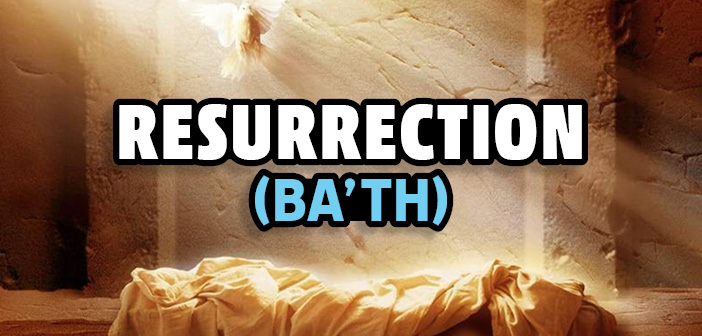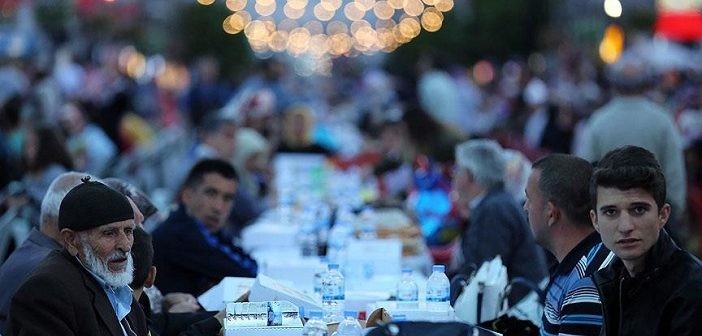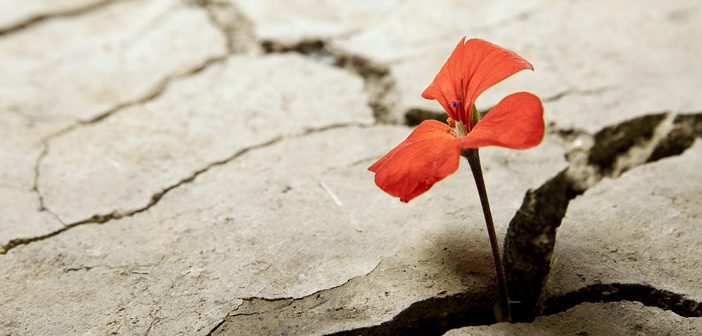
Resurrection (Ba’th)
What is the resurrection in islam? What is the resurrection day in islam? What is the ba'th in islam?
After the Doomsday, Israfīl (as) will blow the Trumpet for the second time and all living beings will be resurrected. According to the belief of the Ahl al-Sunnah, the resurrection will take place in both body and spirit. Allah, who created the human being first, has the power to create the human being a second time after he dies and turns into soil. The Qur’anic verses that state that those who deny the verses will be punished by roasting their skins,[1] and the Qur’anic verses that state the people’s hands, tongue, and feet will testify on Judgment Day[2] demonstrate that the resurrection will occur with both the spirit and body.
The following evidence is introduced in the Qur’an regarding the resurrection:
- First of all, it is possible for a Being who creates something out of nothing for the first time to create that thing for a second time. The following is stated in these Qur’anic verses:
“And he makes comparisons for Us, and forgets his own (origin and) Creation: He says, ‘Who can give life to (dry) bones and decomposed ones (at that)?’ Say, ‘He will give them life Who created them for the first time! for He is Well-versed in every kind of creation!’”[3]
“O mankind! if ye have a doubt about the Resurrection, (consider) that We created you out of dust, then out of sperm, then out of a leech-like clot, then out of a morsel of flesh, partly formed and partly unformed, in order that We may manifest (our power) to you; and We cause whom We will to rest in the wombs for an appointed term, then do We bring you out as babes, then (foster you) that ye may reach your age of full strength; and some of you are called to die, and some are sent back to the feeblest old age, so that they know nothing after having known (much), and (further), thou seest the earth barren and lifeless, but when We pour down rain on it, it is stirred (to life), it swells, and it puts forth every kind of beautiful growth (in pairs).”[4]
- He who creates a difficult thing can create an easier one. The creation of the heavens and the earth is more difficult than the creation of the human being.[5] Moreover, the first creation of human beings is more difficult than the second.[6]
- Allah, who revives a dead place, can also resurrect a human being.[7]
- Anyone who can turn something into its opposite can turn it into something similar. Allah, who brings fire and water out of abundant green trees, can also resurrect human beings.[8]
Knowledge about the resurrection is also given in various hadiths of the Prophet. The following is stated in a hadith, “Everything of the human body will decay except the coccyx bone (ajb al-zanab), and from that bone, Allah will reconstruct the whole body.”[9] In other hadiths, it is stated that all people will be resurrected on the Day of Judgment, that Muhammad will rise first from the grave,[10] and that every servant will be resurrected as he died.[11]
[1] Al-Nisā, 4: 56.[2] Al-Nūr, 24: 24-25.[3] Ya Sin, 36: 78-79.
[4] Al-Ḥajj, 22: 5. Stages of Creation: The stages of creation mentioned in this verse coincide with today’s Anatomy. In this verse, the fetal period is mentioned in the order of “nutfah, alaqah and mudgha”. When one of the 400-500 million male sperm (nutfah) inseminate the female’s egg cell, the embryo (alaqah) period begins and attaches to the female’s ovary and begins to multiply through cell division. First, it takes the form of an indeterminate piece of meat (mudgha), then when the organs become definite, the spirit is blown into it when the fetus is about four months old. The embryo (alaqah) period, which is like a blood clot, lasts about one and a half to two months. During this period, it is permissible to abort the fetus in case of necessity or need. In the period from the formation of the organs until the soul is blown into it, the abortion of the fetus without any reason is not permissible and requires a compensation penalty called “ghurra (one twentieth of full blood money (diyyah))”. However, if the woman has diseases that put her or her life at risk, such as syphilis, cancer, stroke and severe heart disease, these are considered an excuse for abortion. (see Hamdi Döndüren, Aile İlmihali, Ist. 1995, pp. 255-260). It is stated in the Qur’anic verse that a similar development took place in the realm of plants with the drop of water on dry land.
[5] Al-Ahqāf, 46: 33.[6] Al-Rūm, 30: 27.[7] Al-Ḥajj, 22: 5-7.[8] Ya Sin, 36: 80, 81.[9] Al-Bukhari, Tafsīr, 39/3; Muslim, Fitan, 141, 142.[10] Al-Bukhari, Tafsīr, 39/3; Ibn Maja, Janā’iz, 58.[11] Al-Bukhari, Riqāq, 45; Muslim, Jannah, 55-59, 83.
Source: Basic Islamic Principles (ʿilmi ḥāl) According to the Four Sunni Schools With Evidence From The Sources of Islamic Law, Prof. Hamdi Döndüren, Erkam Publications











